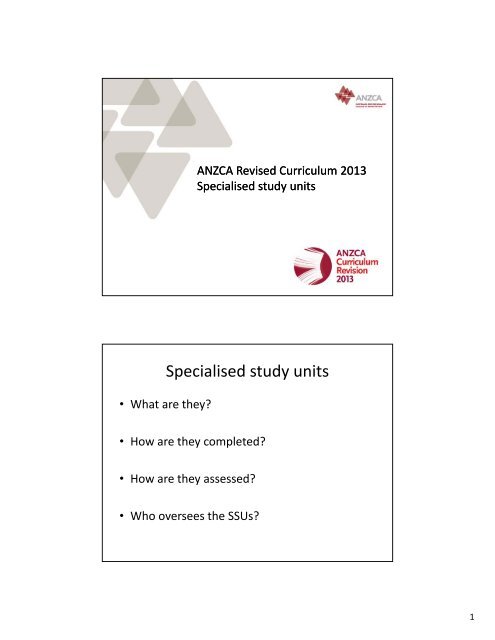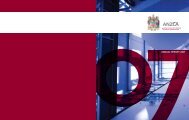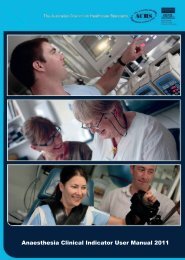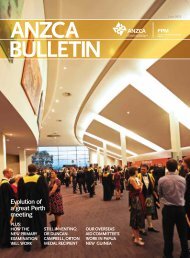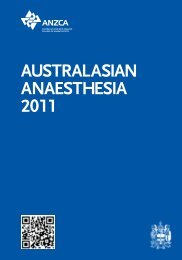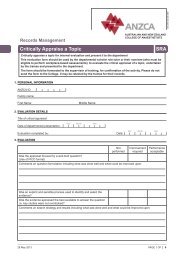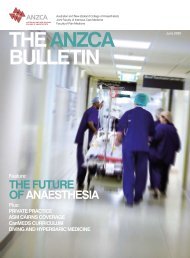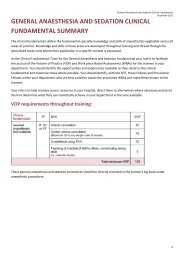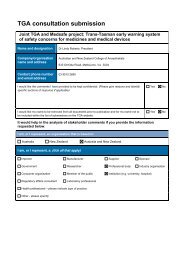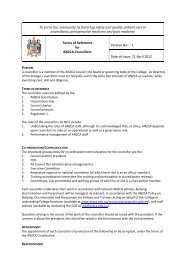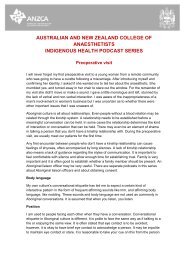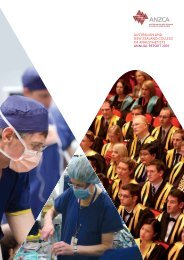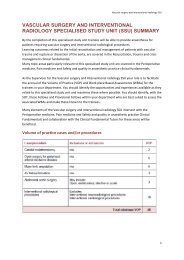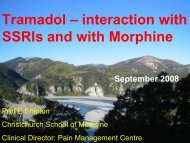ANZCA curriculum revision - specialised study units
ANZCA curriculum revision - specialised study units
ANZCA curriculum revision - specialised study units
Create successful ePaper yourself
Turn your PDF publications into a flip-book with our unique Google optimized e-Paper software.
<strong>ANZCA</strong> Revised Curriculum 2013Specialised <strong>study</strong> <strong>units</strong>• What are they?Specialised <strong>study</strong> <strong>units</strong>• How are they completed?• How are they assessed?• Who oversees the SSUs?1
Specialised <strong>study</strong> <strong>units</strong>• 12 Specialised Study Units (SSUs)• Define the further <strong>specialised</strong> knowledge andskills required for the anaestheticmanagement of patients in specific contexts• They build upon what is learned in ClinicalFundamentals and <strong>ANZCA</strong> roles in the core<strong>study</strong> <strong>units</strong>Specialised Study Units• Head and Neck, ENT, Dental Surgery and ECT• Ophthalmic procedures• Neurosurgery and neuroradiology• General surgical, urological, gynaecologicaland endoscopic procedures• Thoracic surgery• Cardiac surgery and interventional cardiology2
Specialised Study Units• Obstetric anaesthesia and analgesia• Vascular surgery and interventional radiology• Orthopaedic surgery• Intensive care• Paediatric anaesthesia• Plastic, reconstructive and burns surgerySpecialised <strong>study</strong> <strong>units</strong>• Studied concurrently with the core <strong>study</strong> <strong>units</strong>• Majority of SSUs have a volume of practice(VOP) and workplace‐based assessments(WBAs) associated with them• Several may be studied concomitantly andaccumulate required VOP and WBAs, enteredinto the Training Portfolio System (TPS)3
Different Specialised Study Units• Some relate to special patient groups thatrequire <strong>specialised</strong> ili dknowledge and skills– Paediatric anaesthesia– Obstetric anaesthesia and analgesia• Most relate to specific areas of practice thathave <strong>specialised</strong> knowledge and skills– e.g. Thoracic surgery, Neurosurgery andNeuroradiologyDifferent <strong>specialised</strong> <strong>study</strong> <strong>units</strong>• Intensive care is the only SSU with a time‐based VOP‐ inthis case 11 weeks (exclusive of leave)• Some small ‐ ophthalmic procedures may be completedwithin a fairly short period of time• Some large –Paediatric Anaesthesia, Obstetric Anaesthesia& Analgesia –may be completed as a block or progressively• Plastic, reconstructive and burns surgery has knowledgebased learning outcomes only and no mandatory VOP orWBAs ‐ elective WBAs may still be completed in this time4
How are they studied?• SSUs may be studied in a ‘block’ period oftime in a sub‐specialty specialty hospital or they may bestudied over longer periods of time– All require progressive completion of VOP andWBA s in the Training Portfolio System• Once requirements of the SSU are completed– signed off by the relevant SSU Supervisor– notification forwarded to the SoT.WBAs in the SSUs• Some SSUs have mandatory WBAs (DOPS and mini‐CEX)– e.g. Anaesthesia for infants, lung isolation in thoracicsurgery etc.• There are six mandatory WBA –case‐based discussions(CbDs) that must be completed across the SSUs (2 inbasic and 4 in advanced training). Trainees may choosein which SSUs they are completed.• Intensive care has a mandatory multi‐source feedback(MsF)5
Completion of SSUs• All SSUs must be completed by the end ofadvanced dtraining i for completion lti of the ATcore unit review• They must be completed prior tocommencement of provisional fellowshiptraining (PFT)Specialised Study Unit Supervisors(SSUS)• Specialised Study Unit Supervisors (SSUSs) areappointed locally in each department by theSoT and the Head of Department.• SSU supervisors (SSUSs) are appropriatelyqualified specialists with a particular interestin the area of practice of the SSU.• A list of SSUSs will be kept tin each departmenttso that trainees know who to approach forinformation relating to a particular SSU.6
Specialised Study Unit Supervisors(SSUS)• SSUSs will have had training in WBAs and willhave access to <strong>ANZCA</strong> resources relevant to theSSU. This will include teacher training, as well ascases for teaching and learning.• In small departments an individual specialist maytake on several SSUS roles.• The SOT may take on one or more SSUS roles.• In large departments there may be several SSUSfor one SSU, particularly where there is a largeworkload in a specialty hospital.Specialised Study Units• Names familiar, but they are not the same asmodules• Majority of knowledge and skills for training iswithin the Core Study Units –these build onrequired Learning Outcomes in spiral pattern• SSUs extract out what are particularAnaesthetic requirements in a specific context7
SSUs –more information• The most detailed information is in the Curriculumdocument on <strong>ANZCA</strong> website• http://www.anzca.edu.au/training/2013‐trainingprogram/pdfs/anaesthesia‐training‐program<strong>curriculum</strong>.pdf• Brochure with outline of SSUs downloadable from<strong>ANZCA</strong> website• E‐mail specific concerns to <strong>ANZCA</strong>:• <strong>curriculum</strong>@anzca.edu.au8


